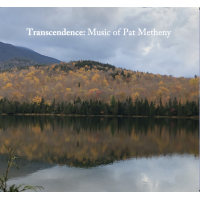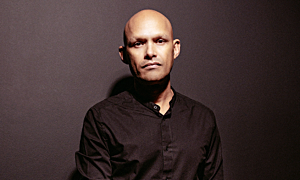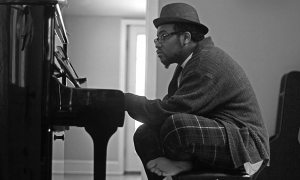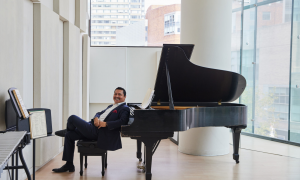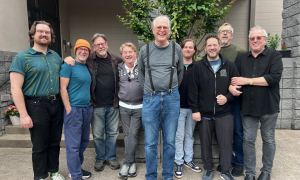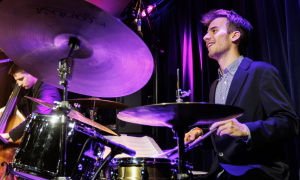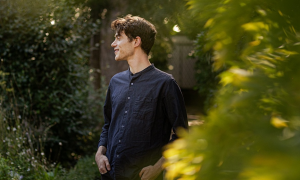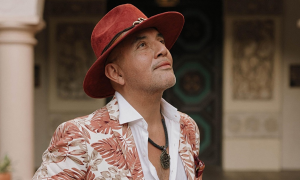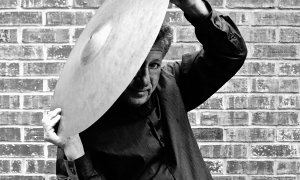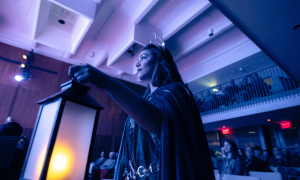Brooklyn based DJ/producer Nickodemus has been an ambassador for global club sounds since he started spinning at the legendary Giant Step parties that rocked New York in the mid 90's. When he founded the legendary Turntables On The Hudson party with his friends Mariano & Nappy G, they continued mixing their eclectic DJ sets with live musicians. The influence of hip-hop, house, reggae, soul and jazz led him to the sounds of Africa, Brazil, the Caribbean, the Middle East and India. Throughout his DJ travels he built an extensive record collection and an extended network of collaborators from Puerto Rico to Beirut who performed on his original recordings and became part of the tapestry that started in the club and manifested itself on his first two full-length records,
Endangered Species and
Sun People.
Outside of the clubs Nickodemus' music has reached far and wide in one of the most iconic iTunes commercials to date when Apple featured his collaboration with
"
data-original-title="" title="">
The Quantic Soul Orchestra and the
Candela All-Stars “Mi Swing es Tropical" in the 2007 summer ad.
Moon People, the new Nickodemus project, is a natural extension of his previous work, an album for night people that also captures the energy of the global village that is New York and features luminaries such as
Afrika Bambaataa, new-Latin/Electo group
Navegante and one of Nickodemus' oldest collaborators
Zeb. Ў°
Sun People had a live organic daytime party sound,Ўұ he explains. Ў°
Moon People is the deeper electronic side of my music. ItЎҜs dedicated to the nocturnal people who work, create, party and operate while the rest of the world is asleep, with hints of playfulness and sunshine.Ўұ
Nickodemus shows his range on Ў°Under the Volcano,Ўұ featuring Latin electro outfit Navegante. It brings together all Latin musicЎҜs diverse roots by incorporating accordion, flute, funk and swing into its undulating cadence. Ў°This is an example of the electronic sounds IЎҜm introducing on the album,Ўұ he explains. Ў°ItЎҜs a fusion of Latin and Arabic music with heavy bass and moody vocals mixed with live instrumentation.Ўұ The sultry vocals of Belleruch singer
Kathrin deBoer sums up the albumЎҜs ethos. Ў°The time is right, when the moon is bright.Ўұ The tracks Latin/Arab fusion includes a dose of hip hop and soul. Afrika Bambaataa drops some old school science on Ў°Alkebulan,Ўұ a tune that links Africa, the Middle East and America, with its trance-like? oud work and multi-layered percussion. The Candela Allstars, a band Nickodemus put together in Puerto Rico for this album, add their Latin swing to Ў°The Nuyorican Express.Ўұ The track rides a thumping house beat, augmented by the bandЎҜs sizzling piano, conga, trumpets and a head twisting percussion break that bounces from speaker to speaker. Ў°ThereЎҜs a Puerto Rican connection on everything IЎҜve done from
Turntables On The Hudson, Volume 1 to
Moon People. This is also is a good representation of my live show.Ўұ
Nickodemus, was born in the Bronx and raised in Queens & Long Island. Before he was a teenager, his sister helped him sneak into shows and music made an indelible impression. Ў°IЎҜd be out till 4 AM and see
Kid Capri juggling stacks of records with
Biz Markie,
Busta Rhymes and other MC's jumping on the mic and hyping the crowd.Ўұ Nico was still in high school when he began spinning at local clubs like Caffeine. Ў°One of my most memorable moments DJ'ing was opening for
KRS-one (BDP) when I was around 18 years old.Ўұ Nico's jazz musician friends inspired him to use the turntable as an instrument, blending diverse sounds into his sets. Ў°I never know how to sum up what I do, other than a world fusion of dance music - hip hop, house, Latin, African, Middle EasternЎӯ it's all aimed at the dance floor.Ўұ
Nickodemus went from block parties to working with the
Giant Step collective. They put on underground parties, combining live performances by MC's, jazz musicians and funk bands with DJs. Ў°Since we played for dancers with musicians on stage, I had to get out of my own space and play things that complimented all the elements that needed to co-exist.Ўұ From there, he moved on to the

 Source:
Source:



 Buy Now
Buy Now

